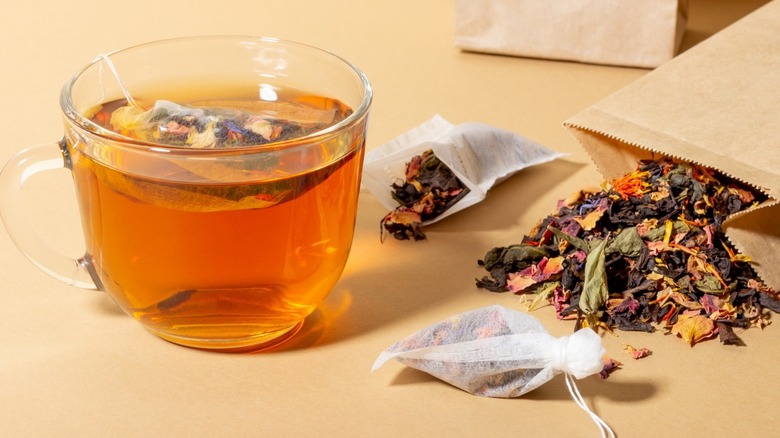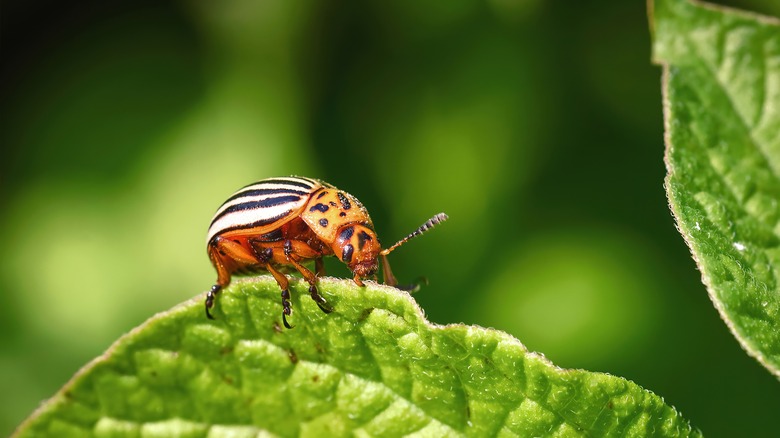New Study Reveals That There Is Insect DNA In Your Tea
Tea is one of the most important and ubiquitous food in the world. It has had a starring role in everything from the start of the Boston Tea Party to intimate moments at home. No matter if it's iced or hot, sweetened or unsweetened, or black or green, tea is a staple that has imbued cuisines and cultures across the globe. And in an odd twist reminiscent of "Jurassic Park," tea was found to have a peculiar link to, believe it or not, insect DNA. Intrigued?
As Newsweek notes, "Researchers have found traces of more than 400 different types of insects in a single tea bag." While this may initially sound unappetizing, it can also be of scientific importance. Researchers may be able to gather environmental DNA information that can inform our knowledge of animals, plants, and the planet as a whole. The study itself consisted of 40 samples of tea, chamomile, mint, and parsley from 17 different brands.
What exactly did the research show?
According to the published research report titled "The Bug in a Teacup – monitoring arthropod-plant associations from environmental DNA with dried plant material," the abstract notes that, "Atypically for eDNA, arthropod DNA in dried plants shows very high temporal stability, opening up plant archives as a source for historical arthropod eDNA." With this discovery, scientists are able to look at a clear, decisive "map" of the history of numerous plants.
A tea bag's infinitesimal size belies the immense significance of this discovery, providing data that were once unable to gather otherwise. This is due to the fact that the minuscule traces of insect DNA in tea bags were from "crushed, dried plant material," which would have otherwise been lost due to UV light or being washed away by rain. In this case, the DNA has been preserved (much like the mosquito in amber from the aforementioned "Jurassic Park" reference). In addition to shining a light on our Earth's history, this information can also help inform what plants attract which insects. This also can help dictate where certain teas or herbs may have originated from.
A word from one of the scientists
Henrik Krehenwinkel, one of the authors of the study and an assistant professor at Trier University in Germany, spoke with The Scientist, noting that, "if an insect bites into a leaf, it will leave a DNA trace; a little bit of saliva is enough ... we know that many insect species are very specific, only living on a certain plant, and when this plant disappears, the insect disappears." This amazing symbiotic connection is left in eDNA and helps build a road map of the life and history of the insect, the plant, and the area in which this connection took place. Krehenwinkel notes that, "we found in green tea up to 400 species of insects in a single tea bag."
Smithsonian Magazine states that researchers used multiple version of the same tea from different brands in order to expand the range of origins in the study, "which would maximize the number of arthropods they could find." Another takeaway is that the presence of insect DNA in tea could be, "a good sign that the tea isn't dripping with pesticides." See, it's not necessarily a bad thing!
Final takeaways
Smithsonian Magazine notes that insects are carried from country to country in a myriad of ways, and in some cases, "wreak havoc on forests or crops" once they land in their new home country. This study can also help trace the path of these insects, as well as further inform scientists on insect populations in decline, insects that can harm particular ecosystems, and more.
Technology Networks Applied Sciences poetically states that "you are tasting an ecosystem suspended in time" each time you take a sip of tea. Researchers say eDNA is more accurate than cameras, traps, or surveillance, and a definite archival record that reflects the precise time and location that a plant or insect once existed. This study also opens up a cavalcade of many other questions, and there's no saying just how far-reaching of an impact this development can have. It'll be fascinating to see whether this leads to further discoveries around tea or other crops.



